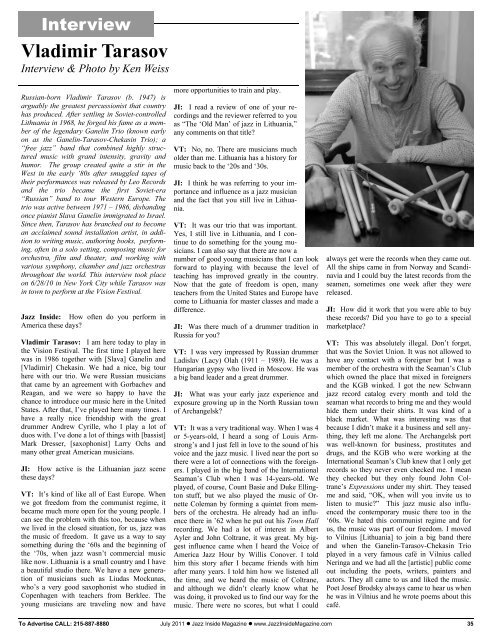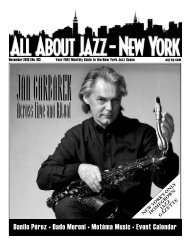Piano Lovers' Celebration Interviews SUMMER ... - Jazz Singers.com
Piano Lovers' Celebration Interviews SUMMER ... - Jazz Singers.com
Piano Lovers' Celebration Interviews SUMMER ... - Jazz Singers.com
Create successful ePaper yourself
Turn your PDF publications into a flip-book with our unique Google optimized e-Paper software.
Interview<br />
Vladimir Tarasov<br />
Interview & Photo by Ken Weiss<br />
Russian-born Vladimir Tarasov (b. 1947) is<br />
arguably the greatest percussionist that country<br />
has produced. After settling in Soviet-controlled<br />
Lithuania in 1968, he forged his fame as a member<br />
of the legendary Ganelin Trio (known early<br />
on as the Ganelin-Tarasov-Chekasin Trio); a<br />
“free jazz” band that <strong>com</strong>bined highly structured<br />
music with grand intensity, gravity and<br />
humor. The group created quite a stir in the<br />
West in the early ‘80s after smuggled tapes of<br />
their performances was released by Leo Records<br />
and the trio became the first Soviet-era<br />
“Russian” band to tour Western Europe. The<br />
trio was active between 1971 – 1986, disbanding<br />
once pianist Slava Ganelin immigrated to Israel.<br />
Since then, Tarasov has branched out to be<strong>com</strong>e<br />
an acclaimed sound installation artist, in addition<br />
to writing music, authoring books, performing,<br />
often in a solo setting, <strong>com</strong>posing music for<br />
orchestra, film and theater, and working with<br />
various symphony, chamber and jazz orchestras<br />
throughout the world. This interview took place<br />
on 6/28/10 in New York City while Tarasov was<br />
in town to perform at the Vision Festival.<br />
<strong>Jazz</strong> Inside: How often do you perform in<br />
America these days?<br />
Vladimir Tarasov: I am here today to play in<br />
the Vision Festival. The first time I played here<br />
was in 1986 together with [Slava] Ganelin and<br />
[Vladimir] Chekasin. We had a nice, big tour<br />
here with our trio. We were Russian musicians<br />
that came by an agreement with Gorbachev and<br />
Reagan, and we were so happy to have the<br />
chance to introduce our music here in the United<br />
States. After that, I’ve played here many times. I<br />
have a really nice friendship with the great<br />
drummer Andrew Cyrille, who I play a lot of<br />
duos with. I’ve done a lot of things with [bassist]<br />
Mark Dresser, [saxophonist] Larry Ochs and<br />
many other great American musicians.<br />
JI: How active is the Lithuanian jazz scene<br />
these days?<br />
VT: It’s kind of like all of East Europe. When<br />
we got freedom from the <strong>com</strong>munist regime, it<br />
became much more open for the young people. I<br />
can see the problem with this too, because when<br />
we lived in the closed situation, for us, jazz was<br />
the music of freedom. It gave us a way to say<br />
something during the ‘60s and the beginning of<br />
the ‘70s, when jazz wasn’t <strong>com</strong>mercial music<br />
like now. Lithuania is a small country and I have<br />
a beautiful studio there. We have a new generation<br />
of musicians such as Liudas Mockunas,<br />
who’s a very good saxophonist who studied in<br />
Copenhagen with teachers from Berklee. The<br />
young musicians are traveling now and have<br />
more opportunities to train and play.<br />
JI: I read a review of one of your recordings<br />
and the reviewer referred to you<br />
as “The ‘Old Man’ of jazz in Lithuania,”<br />
any <strong>com</strong>ments on that title?<br />
VT: No, no. There are musicians much<br />
older than me. Lithuania has a history for<br />
music back to the ‘20s and ‘30s.<br />
JI: I think he was referring to your importance<br />
and influence as a jazz musician<br />
and the fact that you still live in Lithuania.<br />
VT: It was our trio that was important.<br />
Yes, I still live in Lithuania, and I continue<br />
to do something for the young musicians.<br />
I can also say that there are now a<br />
number of good young musicians that I can look<br />
forward to playing with because the level of<br />
teaching has improved greatly in the country.<br />
Now that the gate of freedom is open, many<br />
teachers from the United States and Europe have<br />
<strong>com</strong>e to Lithuania for master classes and made a<br />
difference.<br />
JI: Was there much of a drummer tradition in<br />
Russia for you?<br />
VT: I was very impressed by Russian drummer<br />
Ladislav (Lacy) Olah (1911 – 1989). He was a<br />
Hungarian gypsy who lived in Moscow. He was<br />
a big band leader and a great drummer.<br />
JI: What was your early jazz experience and<br />
exposure growing up in the North Russian town<br />
of Archangelsk?<br />
VT: It was a very traditional way. When I was 4<br />
or 5-years-old, I heard a song of Louis Armstrong’s<br />
and I just fell in love to the sound of his<br />
voice and the jazz music. I lived near the port so<br />
there were a lot of connections with the foreigners.<br />
I played in the big band of the International<br />
Seaman’s Club when I was 14-years-old. We<br />
played, of course, Count Basie and Duke Ellington<br />
stuff, but we also played the music of Ornette<br />
Coleman by forming a quintet from members<br />
of the orchestra. He already had an influence<br />
there in ’62 when he put out his Town Hall<br />
recording. We had a lot of interest in Albert<br />
Ayler and John Coltrane, it was great. My biggest<br />
influence came when I heard the Voice of<br />
America <strong>Jazz</strong> Hour by Willis Conover. I told<br />
him this story after I became friends with him<br />
after many years. I told him how we listened all<br />
the time, and we heard the music of Coltrane,<br />
and although we didn’t clearly know what he<br />
was doing, it provoked us to find our way for the<br />
music. There were no scores, but what I could<br />
always get were the records when they came out.<br />
All the ships came in from Norway and Scandinavia<br />
and I could buy the latest records from the<br />
seamen, sometimes one week after they were<br />
released.<br />
JI: How did it work that you were able to buy<br />
these records? Did you have to go to a special<br />
marketplace?<br />
VT: This was absolutely illegal. Don’t forget,<br />
that was the Soviet Union. It was not allowed to<br />
have any contact with a foreigner but I was a<br />
member of the orchestra with the Seaman’s Club<br />
which owned the place that mixed in foreigners<br />
and the KGB winked. I got the new Schwann<br />
jazz record catalog every month and told the<br />
seaman what records to bring me and they would<br />
hide them under their shirts. It was kind of a<br />
black market. What was interesting was that<br />
because I didn’t make it a business and sell anything,<br />
they left me alone. The Archangelsk port<br />
was well-known for business, prostitutes and<br />
drugs, and the KGB who were working at the<br />
International Seaman’s Club knew that I only get<br />
records so they never even checked me. I mean<br />
they checked but they only found John Coltrane’s<br />
Expressions under my shirt. They teased<br />
me and said, “OK, when will you invite us to<br />
listen to music?” This jazz music also influenced<br />
the contemporary music there too in the<br />
‘60s. We hated this <strong>com</strong>munist regime and for<br />
us, the music was part of our freedom. I moved<br />
to Vilnius [Lithuania] to join a big band there<br />
and when the Ganelin-Tarasov-Chekasin Trio<br />
played in a very famous café in Vilnius called<br />
Neringa and we had all the [artistic] public <strong>com</strong>e<br />
out including the poets, writers, painters and<br />
actors. They all came to us and liked the music.<br />
Poet Josef Brodsky always came to hear us when<br />
he was in Vilnius and he wrote poems about this<br />
café.<br />
To Advertise CALL: 215-887-8880 July 2011 � <strong>Jazz</strong> Inside Magazine � www.<strong>Jazz</strong>InsideMagazine.<strong>com</strong><br />
35




